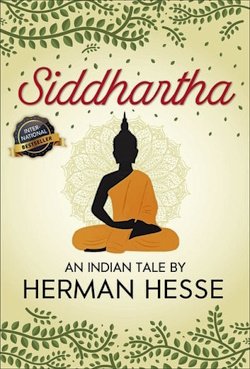“nay-saying” attitude toward life? Aristotle writes that such isolation is unnatural to man:
The proof that the state is a creation of nature and prior to the individual is that the individual, when isolated, is not self-sufficing; and therefore he is like a part in relation to the whole. But he who is unable to live in society, or who has no need because he is sufficient for himself, must be either a beast or a god: he is no part of a state. A social instinct is implanted in all men by nature, and yet he who first founded the state was the greatest of benefactors. For man, when perfected, is the best of animals, but, when separated from law and justice, he is the worst of all. . . 4
Discuss whether you think Siddhartha’s quest is egocentrically antiso-cial.
5. Discuss whether Siddhartha’s vanity prevents his ability to learn about himself. He says, “It took me a long time and I am not finished learning 1.
Angela Carter. Nights at the Circus London: Chatto & Windus, 1984.
2.
Aldous Huxley. Island. New York: Harper & Bros., 1962.
3.
A Bodhisattva is one who is enlightened or obtains "perfect wisdom" through either compassion for others ( Mahayana Buddhism) or individualistic effort ( Theravada Buddhism).
4.
Aristotle. Politica. Translated by David Ross. In Richard McKeon, ed. The Basic Works of Aristotle. New York: Random House, 1970. Book I, Ch. 2, 26-32.
20
Siddhartha: An Open-Source Text
Chapter 2. With the Samanas
this yet, oh Govinda; that there is nothing to be learned! There is indeed no such thing, so I believe, as what we refer to as ‘learning.’”
Thomas Szasz notes that learning impacts the ego:
Every act of conscious learning requires the willingness to suffer an injury to one’s self-esteem. That is why young children, before they are aware of their own self-importance, learn so easily; and why older persons, especially if vain or important, cannot learn at all.5
Does Siddhartha’s pride prevent him from learning from others?
6. Purportedly, with intense meditation and the “conquering of self” come magical powers, the so-called siddhis. Cambridge educated Christmas Humphreys, founder of the London Buddhist Society, writes. . .
It follows that only as we learn to detach our consciousness from its lower vehicles, that is, to learn that it is not our consciousnessness at all, can we achive the impersonal, dispassionate veiwpoint of the Middle Way. Yet in success along this path is found the normal development of the siddhis, those super-normal powers which foolish persons seek to develop in order to satisfy their personal desires. For as the mind itself is a product of the gunas, being of the world of form, it follows that control of the mind will prepare the way for control of other manisfestations of the qualities, including those forces of nature by whose aid the siddhis operate. Hence the mysterious powers of telepathy, clairvoyance, levitation and the like whose secret lies in the fundamental identity of force and matter, and of the forces of nature with those of the mind.6
How is it that Siddhartha is able to see that these so-called psychic, magical, or miraculous powers he has achieved are deceptive and foolish su-perstitious practices devoid of spiritual significance?
5.
Thomas Szasz. The Second Sin. New York: Anchor Press, 1973.
6.
Christmas Humphreys. Concentration and Meditation: A Manual of Mind Development. Baltimore, Maryland: Penguin Books Inc., 1970. 171.
Siddhartha: An Open-Source Text
21

Chapter 3
Gotama
Buddha Preaching, Library of Congress
From the reading. . .
“Be aware of too much wisdom!”
Ideas of Interest from “Gotama”
1. Why doesn’t it bother these holy men to beg for a living? Explain the difference in cultural values. Huston Smith points out the seeker of truth or reality or Self does not seek to be economically independent, but seeks to be independent of economics.1
2. How was it that Siddhartha could instantly recognize the Buddha and Govinda could not? Was Siddhartha intuitively aware of the principles 1.
Huston Smith. Religions of Man. New York: New American Library. 1958.
22
Chapter 3. Gotama
of kinesics (the science of body language)?

























